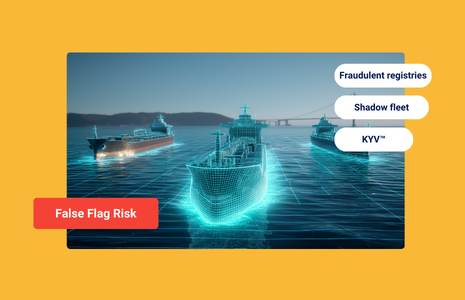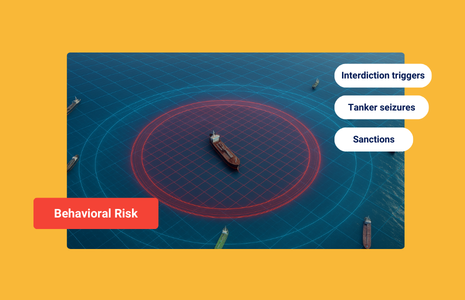5 Key Findings & Implications from RUSI’s Taskforce’s Last Report

What’s inside?
The Royal United Services Institute (RUSI) Maritime Sanctions Taskforce published its second meeting report at the beginning of 2025, offering an in-depth analysis of the evolving dynamics of the shadow fleet.
This comprehensive document sheds light on the sophisticated methods employed by the fleet to circumvent international sanctions, particularly those targeting Russia and Iran. For professionals in the maritime industry – including traders, shippers, government agencies and law enforcement, etc. – understanding these developments is crucial for maintaining compliance and mitigating associated risks.
Defining the 2025 Shadow Fleet
The term “shadow fleet” refers to vessels that operate clandestinely to evade sanctions, often by engaging in deceptive shipping practices (DSPs). These include tactics such as disabling Automatic Identification Systems (AIS), conducting illicit ship-to-ship transfers, and falsifying cargo and vessel documentation. The RUSI report emphasizes that these fleets have become more sophisticated, adapting swiftly to new sanctions and employing advanced methods to obscure their activities.
5 Key Findings from the RUSI Report
- Shadow fleet analysis: the shadow fleet is categorized into three groups: cleared fleet (no suspicious activity), grey fleet (operating in legal ambiguities), and dark fleet (engaged in illicit activities). The Russian shadow fleet includes vessels with opaque ownership structures, primarily involved in oil trade. New hubs for shadow fleet activity have emerged in Brazil and the Arctic Sea, with increased use of location tampering to evade detection.
- Definitions and enforcement: The International Maritime Organization (IMO) definition of the shadow fleet is considered the most viable for enforcement, emphasizing illegal operations, evasion of inspections, and DSPs. Clear definitions are essential for consistent enforcement across jurisdictions.
- Refining designations: the taskforce recommends refining vessel designations to target shadow fleet vessels and facilitators, while avoiding unintended consequences. It suggests delisting compliant vessels, granting licenses for scrapping obsolete tankers, and targeting ship management companies rather than individual seafarers.
- Enforcement gaps and regulatory shortcomings: the report identifies significant enforcement gaps that allow shadow fleet operations to persist. A critical issue is the lack of uniformity in international regulations and the inconsistent application of existing laws across jurisdictions. This fragmentation creates opportunities for illicit actors to exploit regulatory loopholes. The report calls for enhanced international collaboration to harmonize enforcement efforts and close these gaps.
- Flag-state challenges: flag states, responsible for the oversight of vessels registered under their flags, often face challenges in monitoring and controlling ships engaged in sanctionable activities. Some flag states may lack the resources or political will to enforce compliance effectively, while others may be complicit in allowing such operations. The report suggests that diplomatic engagement and capacity-building initiatives are essential to strengthen flag-state enforcement mechanisms.
Implications for Industries and Governments
There are several connecting threads between the above key findings. Everyone involved should harness AI and Gen AI capabilities to obtain greater visibility and maritime domain awareness into what is happening with the shadow fleet. This includes knowing which vessels are part of the shadow fleet, and being able to quickly and automatically detect detective shipping practices.
“…while avoiding unintended consequences” in key finding #3 above is an important rejoinder. Accurate detection and tracking is necessary, to avoid false positives, potentially causing your business missed revenue opportunities.
And enforcement gaps and flag-state challenges can only be solved by equipping the relevant law enforcement agencies with power AI and Gen AI tools. Greater communication and collaboration between the groups can be achieved via solutions that make sharing real-time information easy and intuitive.
The proliferation of shadow fleet activities has profound implications for various stakeholders:
- Insurers and P&I clubs: there is an increased risk of unknowingly providing coverage to vessels involved in illicit activities, which can lead to legal liabilities and reputational damage. Enhanced due diligence and the use of advanced tracking technologies are recommended to mitigate these risks.
- Traders and refiners: engaging with shadow fleet vessels can result in severe penalties and supply chain disruptions. Implementing robust compliance programs and conducting thorough vetting of shipping partners are critical to avoid inadvertent violations.
- Government authorities: regulatory bodies must adapt to the evolving tactics of shadow fleets by developing more agile and responsive enforcement strategies. This includes investing in intelligence-sharing platforms and fostering international cooperation to track and interdict illicit maritime activities effectively.
Looking Ahead: Preparing for Increased Scrutiny
As geopolitical tensions persist and sanctions regimes become more complex, the maritime industry should anticipate heightened scrutiny from regulators and enforcement agencies. Proactive measures, such as investing in compliance training, adopting cutting-edge monitoring systems, and engaging in industry forums to stay informed about emerging threats, will be essential in navigating this challenging landscape.
Join the Upcoming Webinar with RUSI and Windward
To delve deeper into these findings and discuss actionable strategies, Windward is hosting an exclusive webinar in collaboration with RUSI’s Maritime Sanctions Taskforce. This session will feature expert insights on the shadow fleet’s impact and offer guidance on enhancing compliance frameworks.
Date and Time: Tuesday, April 29, 2025, at 9:30 AM GMT | 5:30 PM SGT
Don’t miss this opportunity to gain a comprehensive understanding of the shadow fleet phenomenon and learn how to safeguard your operations against emerging compliance challenges.
Trending
- The EU’s 18th Sanctions Package Lookback Started. Trading Russian Products? You're At Risk. Nov 24, 2025
- Tanker Freight Rates Hit Five-Year High Amid Russian Oil Sanctions Shake-Out Nov 6, 2025
- Sanctioned, Stateless, and Still Sailing: Expert Insights from the Frontlines of Maritime Sanctions Nov 3, 2025











